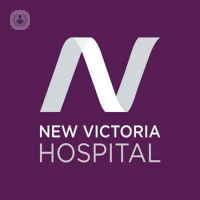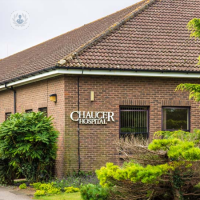What is Morton’s neuroma?
Morton’s neuroma (also known as Morton’s metatarsalgia or interdigital neuroma) is a painful condition of the foot caused by one of the nerves between the toes becoming irritated and the tissue around it becoming thickened. It most commonly affects the nerve between the third and fourth toes, but can also affect the nerve between the second and third toes.
The pain caused by Morton’s neuroma is often said to feel like you are standing a pebble in your shoe, but the pain can be sharp, and the toes may also sting or experience numbness.

What are the main symptoms of Morton’s neuroma?
There are no outward symptoms of Morton’s neuroma; instead it manifests as painful or uncomfortable sensations in the ball of the foot and the toes, including:
- A sharp shooting pain in the ball of the foot
- A burning sensation in the ball of the foot, perhaps radiating to the toes
- The sensation that you are standing on a small stone or a fold in your socks
- Stinging, tingling, burning, or numbness in the toes
It is recommended that you see a doctor if the symptoms last more than a few days.
What are the causes of Morton’s neuroma?
It is not fully understood what causes the nerves in the foot to become irritated and subsequently thickened, but it is this irritation and thickening that causes the pain associated with Morton’s neuroma. It is thought that the cause is some sort of damage to the nerve, either by over-compressing or over-stretching it.
Some risk factors include:
- Wearing high heels or other tight or ill-fitting shoes
- Certain sports, especially those involving repeated impacts on the foot, such as running and racquet sports
- Other foot problems, e.g. high arches, flat feet, etc.
It is unclear if these factors are direct causes of Morton’s neuroma, or simply things that exacerbate it.
How is Morton’s neuroma treated?
Treatment for Morton’s neuroma depends on the individual case; the doctor will discuss options with the patient based on the severity and how long the patient has had the condition.
Non-surgical options to reduce pressure on the foot or offer pain relief include:
- Change of footwear
- Orthotic devices
- Losing weight
- Injections – steroids or alcohol solutions can relieve pain.
- Painkillers – over-the-counter pills like ibuprofen may be recommended to reduce inflammation and pain.
Not all patients respond to these methods, in which case, surgery may be advised. This may involve removing tissue around the nerve to create more space and reduce pressure, or removing part of the nerve itself.
Which type of specialist treats Morton’s neuroma?
Many orthopaedic surgeons, especially those that specialise in foot and ankle problems will treat Morton’s neuroma. There are also special foot doctors called podiatrists, who have expertise in this area.
05-03-2013 10-31-2023Morton's neuroma
Mr Paul Hamilton - Orthopaedic surgery
Created on: 05-03-2013
Updated on: 10-31-2023
Edited by: Conor Lynch
What is Morton’s neuroma?
Morton’s neuroma (also known as Morton’s metatarsalgia or interdigital neuroma) is a painful condition of the foot caused by one of the nerves between the toes becoming irritated and the tissue around it becoming thickened. It most commonly affects the nerve between the third and fourth toes, but can also affect the nerve between the second and third toes.
The pain caused by Morton’s neuroma is often said to feel like you are standing a pebble in your shoe, but the pain can be sharp, and the toes may also sting or experience numbness.

What are the main symptoms of Morton’s neuroma?
There are no outward symptoms of Morton’s neuroma; instead it manifests as painful or uncomfortable sensations in the ball of the foot and the toes, including:
- A sharp shooting pain in the ball of the foot
- A burning sensation in the ball of the foot, perhaps radiating to the toes
- The sensation that you are standing on a small stone or a fold in your socks
- Stinging, tingling, burning, or numbness in the toes
It is recommended that you see a doctor if the symptoms last more than a few days.
What are the causes of Morton’s neuroma?
It is not fully understood what causes the nerves in the foot to become irritated and subsequently thickened, but it is this irritation and thickening that causes the pain associated with Morton’s neuroma. It is thought that the cause is some sort of damage to the nerve, either by over-compressing or over-stretching it.
Some risk factors include:
- Wearing high heels or other tight or ill-fitting shoes
- Certain sports, especially those involving repeated impacts on the foot, such as running and racquet sports
- Other foot problems, e.g. high arches, flat feet, etc.
It is unclear if these factors are direct causes of Morton’s neuroma, or simply things that exacerbate it.
How is Morton’s neuroma treated?
Treatment for Morton’s neuroma depends on the individual case; the doctor will discuss options with the patient based on the severity and how long the patient has had the condition.
Non-surgical options to reduce pressure on the foot or offer pain relief include:
- Change of footwear
- Orthotic devices
- Losing weight
- Injections – steroids or alcohol solutions can relieve pain.
- Painkillers – over-the-counter pills like ibuprofen may be recommended to reduce inflammation and pain.
Not all patients respond to these methods, in which case, surgery may be advised. This may involve removing tissue around the nerve to create more space and reduce pressure, or removing part of the nerve itself.
Which type of specialist treats Morton’s neuroma?
Many orthopaedic surgeons, especially those that specialise in foot and ankle problems will treat Morton’s neuroma. There are also special foot doctors called podiatrists, who have expertise in this area.


Morton’s neuroma: how to relieve pain in the ball of your foot
By Mr Paul Hamilton
2025-01-13
If you are living with unbearable pain in the ball of your foot, it might be Morton's neuroma, which is the thickening of the tissues around the nerves, which leads to the toes. We spoke to consultant orthopaedic surgeon Mr Peter Hamilton about the neoconservative treatment options that you can try at home. See more


What is Morton’s Neuroma?
By Mr Simon W Sturdee
2025-01-09
Morton’s Neuroma is a condition that causes pain under the ball of the foot. Tissue around one of the nerves leading to the toes causes a sharp, burning pain in the foot and can also cause the toes to feel numb, to burn or to sting. Mr Simon W Sturdee explains more about Morton’s Neuroma, treatment and the complications associated with surgery to remove the neuroma (nerve). See more


Morton’s Neuroma
By Mr Turab Syed
2024-12-30
Morton’s neuroma is one of the most common causes of forefoot pain. Found out how you can alleviate this pain with Mr Turab Syed’s expert advice. See more
Experts in Morton's neuroma
-
Mr Paul Hamilton
Orthopaedic surgeryExpert in:
- Bunion (hallux valgus)
- Achilles tendon
- Arthritis
- Sprained ankle
- Morton's neuroma
- Plantar fasciitis
-
Professor Bal Dhinsa
Orthopaedic surgeryExpert in:
- Sports injuries
- Tendon injuries
- Arthritis
- Bunion (hallux valgus)
- Minimally invasive bunion surgery
- Morton's neuroma
-
Mr Andrew McAndrew
Orthopaedic surgeryExpert in:
- Foot and ankle
- Knee surgery
- Knee arthroscopy
- Morton's neuroma
- Sports injuries
- Traumatic injury
-
Mr Anil Prasanna
Orthopaedic surgeryExpert in:
- Foot and ankle
- Minimally invasive bunion surgery
- Ankle arthroscopy
- Sports injuries
- Ankle instability
- Morton's neuroma
-
Mr Loren Charles
Orthopaedic surgeryExpert in:
- Hip replacement
- Knee replacement
- Knee arthroscopy
- Bunion (hallux valgus)
- Toe pain
- Morton's neuroma
- See all

The Harborne Hospital - part of HCA Healthcare
The Harborne Hospital - part of HCA Healthcare
Mindelsohn Way, B15 2FQ
No existe teléfono en el centro.
By using the telephone number provided by TOP DOCTORS, you automatically agree to let us use your phone number for statistical and commercial purposes. For further information, read our Privacy Policy
Top Doctors

New Victoria Hospital
New Victoria Hospital
184 Coombe Lane West, Kingston upon Thames, KT2 7EG
No existe teléfono en el centro.
By using the telephone number provided by TOP DOCTORS, you automatically agree to let us use your phone number for statistical and commercial purposes. For further information, read our Privacy Policy
Top Doctors

The Chaucer Hospital - part of Circle Health Group
The Chaucer Hospital - part of Circle Health Group
Nackington Rd, Canterbury CT4 7AR,
No existe teléfono en el centro.
By using the telephone number provided by TOP DOCTORS, you automatically agree to let us use your phone number for statistical and commercial purposes. For further information, read our Privacy Policy
Top Doctors
-
The Harborne Hospital - part of HCA Healthcare
Mindelsohn Way, B15 2FQ, BirminghamExpert in:
- Digestive
- Cancer
- Orthopaedic surgery
- Thoracic Surgery
- Diagnostic Imaging
- Obstetrics and Gynaecology
-
New Victoria Hospital
184 Coombe Lane West, Kingston upon Thames, KT2 7EG, South LondonExpert in:
- Cardiology
- General Surgery
- Orthopaedic surgery
- Breast augmentation
- Pain management
- Spine
-
The Chaucer Hospital - part of Circle Health Group
Nackington Rd, Canterbury CT4 7AR,, CanterburyExpert in:
- Hip
- Cataracts
- Orthopaedic surgery
- Ophthalmology
- Knee
- Most viewed diseases, medical tests, and treatments
- Ulnar nerve entrapment
- Peripheral nerve block
- Peripheral neuropathy
- Joint pain
- Lumbar herniated disc
- Spinal surgery
- Minimal access surgery (keyhole surgery)
- Shoulder pain
- Osteoporosis
- Botulinum toxin (Botox™)







